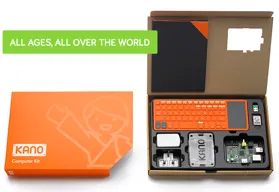Kano: A computer anyone can assemble, for coding and learning

In January, 2013, I met Yonatan Raz-Fridman, Co-founder and CEO of Kano Computing, in London. During our brief conversation, we discussed many things, but one thing that particularly stayed in my mind was his passion for building a computer that any child could assemble. A computer that anyone, anywhere could use to learn to code and build his or her own game. This product, to me, described the overarching vision of the company.Fast forwarding to the present, Yonatan, along with his Co-founders Alex Klein and Saul Klein, has not only put together a great team around this amazing idea, and raised seed funding from friends and family, but also built the first prototype of that computer, Kano. They started a Kickstarter campaign for crowdfunding to manufacture the product and it has been a hit. (You can access the Kickstarter Campaign here.)
In just the first 18 hours of launching the campaign, Kano met the goal of USD 100,000. Currently, they have raised around USD 700,000 with 23 more days to go. The success of this crowdfunding campaign highlights the need for simplicity in learning modules that kids all over the world wish for.
Kano computer kit is built using Raspberry Pi, a credit-card-sized single-board computer developed in the UK by the Raspberry Pi Foundation. It is a wholesome product, brought to light by applying design thinking principles and using open source resources. Kano represents the emerging trend of technological innovation in hardware, and takes out the complexity of putting together your own computer, thereby giving a sense of accomplishment to every user .
YourStory catches up with Yonatan while he is traveling to gather critical feedback from Kano's customers.
What inspired you to build this product?
I have been interested for quite a long time in the need to provide new tools to people around the world, and not just tools, but those which will empower them to learn, make and express themselves, regardless of their age and geographic location. I got together with my co-founders, Alex Klein and Saul Klein on this. Our first challenge was set by Micah, Saul's seven-year-old son, who asked us to make the Raspberry Pi as simple and fun as Lego. So that’s what we are trying to do, for Micah and for millions of young people around the world – the new creative generation.
What has been the biggest challenge for you so far in building this product?
I think that there are different challenges depending on the stage of the company. Looking at the last 12 months since we started, I think that creating something that people want is a big challenge, as it requires us not to make too many assumptions, but actually to build something preliminary, go out and test it with potential customers, and see if it works. I’m very happy we went through this execution, as we have learned a lot. Another aspect, which continues to be a challenge, is hiring the right people. We have a great team that works with us on Kano. Some of them, like our software architect, Alejandro Simon, left companies like Sony to join us even before we had an office. It’s challenging to make people leave their job and join you so early on.
Your Kickstarter campaign has been a massive success. You have already raised seven times the money that you intended to raise initially. What do you think people liked in the product?
That it is human. It speaks to everyone. People understand the need for giving accessible tools that anyone can play, make and experiment with, and of course, learn new skills. I believe that people also noticed our attention to detail, the simplicity of Lego and the fun element of a game, as well as our mission and story.
What’s next for Kano Computing?
We will focus on reaching out to as many people as possible, all over the world, and give them a reason to care, share and support Kano. Then we would like to work hard on fulfilling our commitments to our supporters on Kickstarter, and deliver them exactly what we’ve promised, and on time. Beyond that, we have more dreams but that’s for another story.
What are your plans for India and South-East Asia in general?
95% of the Indian population does not have a computer. India is one of the most fascinating societies, and there is a clear problem of learning, education and accessibility of technology, both for consumption and creation. We believe that economies such as India can, and should strive in an era like we are living now. Yes, there is Bangalore, but the majority of the population is locked. We think that Kano can help change that, and we are excited to explore opportunities with companies and organizations, and bring Kano to young people in India. South-East Asia is no different, but we need to carefully explore our steps, especially as we are a young company.
Here are some of the videos that capture the entire story:
If you are excited about this product, know a kid who will enjoy building his or her own computer and want to get your hands on it before it sells out, login to Kickstarter and order your Kano computing kit here







